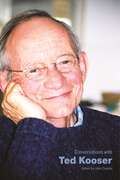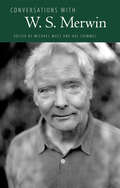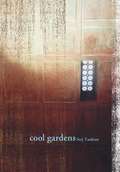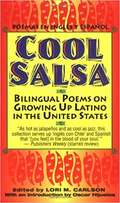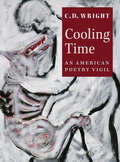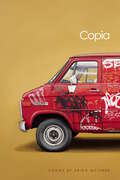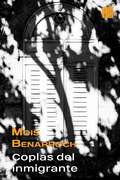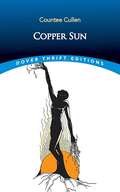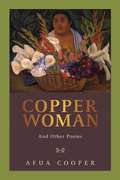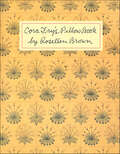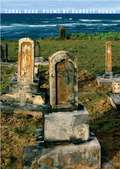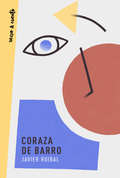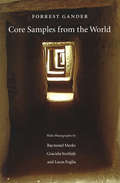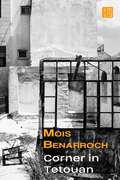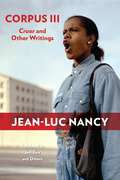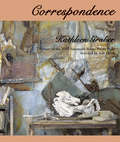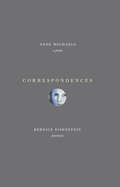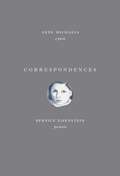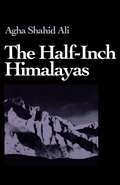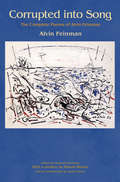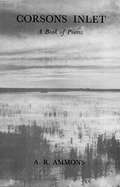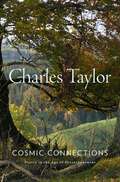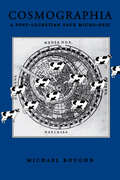- Table View
- List View
Conversations with Ted Kooser (Literary Conversations Series)
by John CusatisIn twenty-one interviews spanning nearly half a century, Conversations with Ted Kooser chronicles the Nebraska writer’s rise from a regional poet of the Great Plains to a Pulitzer Prize–winning artistic luminary. His candor, clarity, and eloquence, which distinguish Kooser’s plentiful body of work, color these edifying and entertaining conversations. The interviews in Conversations with Ted Kooser are conducted by esteemed poets and critics, radio hosts, and journalists. They discuss Kooser’s life and career as well as his award-winning poetry, prose, and children’s books. The collection includes two previously unpublished interviews, separated by a twenty-year period, with poet/scholar Mary K. Stillwell, author of The Life and Poetry of Ted Kooser, as well as live interviews broadcast on NPR’s Fresh Air with Terry Gross and Library of Congress host Grace Cavalieri’s The Poet and the Poem. The book also features thirty of Kooser’s poems, accompanied by his commentary on their genesis. Seventeen of these are drawn from his Pulitzer Prize–winning collection, Delights & Shadows. Kooser (b. 1939) is a two-term United States Poet Laureate, dedicated to making engaging poetry available to all readers. His syndicated newspaper column, “American Life in Poetry,” begun during his tenure as poet laureate, delivered contemporary poems by poets from across the nation to more than four million readers, long after his laureateship ended. Now in his mid-eighties, Kooser remains highly prolific and internationally popular, continuing to compose life-affirming—and, as many attest, life-changing—poems, celebrating the wonders of the natural world, the subtle grandeur of human connection, and the unifying order he observes in all creation.
Conversations with W. S. Merwin (Literary Conversations Series)
by Michael Wutz and Hal CrimmelConversations with W. S. Merwin is the first collection of interviews with former United States Poet Laureate W. S. Merwin (b. 1927). Spanning almost six decades of conversations, the collection touches on such topics as Merwin's early influences (Robert Graves and Ezra Pound), his location within the twin poles of Walt Whitman and Henry David Thoreau, and his extraordinary work as a translator, as well as his decades-long interest in environmental conservation. Anticipating the current sustainability movement and the debates surrounding major and minor literatures, Merwin was, and still is, a visionary.He is among the most distinguished poets, translators, and thinkers in the United States. A major link between the period of literary modernism and its contemporary extensions, Merwin has been a force in American letters for many decades, and his translations from the Spanish, French, Italian, Japanese, and other languages have earned him unanimous praise and admiration. Merwin also wrote at the forefront of literature's environmental advocacy and early on articulated concerns about ecology and sustainability.Conversations with W. S. Merwin offers insight into the various dimensions of Merwin's thought by treating his interviews as a self-standing category in his oeuvre. More than casual narratives that interpret the occasional poem or relay an occasional experience, they afford literary and cultural historians a view into the larger throughlines of Merwin's thinking.
Cool Daddy Rat
by Kristyn CrowEvery night, Cool Daddy Rat takes his bass case and goes out to play jazz and scat around the city. But one night he hears something strange: Peeky squeaky who dat? It's his son, Ace, hiding in the bass case! After a reassuring call to Mama, the pair go all over the city together, filling the streets with his sweet beat. And when Ace can't contain himself any longer, Cool Daddy Rat finds out he's the best scatter in the family. Image descriptions present.
Cool Gardens
by Serj TankianFrom Serj Tankian, lead vocalist for critically acclaimed band System of a Down, comes a striking debut poetry collection highlighting his best work of the past eight years.
Cool Salsa: Bilingual Poems on Growing Up Latino in the United States
by Lori M. CarlsonPoemas en Inglés y Español.
Cooling Time
by C. D. WrightC. D. Wright takes her title from a line of legal defense, peculiar to Texas courts, in which it is held that if a man kills before having had time "to cool" after receiving an injury or an insult he is not guilty of murder.Cooling Time is a new type of book, an unruly vigil that is an interconnected memoir-poem-essay about contemporary American poetry. Ever focused on possibilities, Wright demonstrates that "the search for models becomes a search for alternatives," and thereby defines the terms by which poets can chart their own course.These are some of the things I have touched in my life that are forbidden: paintings behind velvet ropes, electric fencing, a vault in an office, gun in a drawer, my brother's folding money, the poet's anus, the black holes in his heart--where his life went out of him.Tell me, what is the long stretch of road for if not to sort out the reasons why we are here and why we do what we do, from why we are not in the other lane doing what others do.Poetry is like food remarked one of my first teachers, freeing me to dislike Rocky Mountain Oysters and Robert Lowell. The menu is vast, the list of things I don't want in my mouth relatively short.C.D. Wright, author of nine books of poetry, teaches at Brown University. She lives in Providence, Rhode Island, with poet Forrest Gander.
Copia
by Erika Meitner"The poems in Copia are about what is and what is almost-gone, what is in limbo and what won't give way, what is almost at rock bottom but still and always brimming with the possibility of miracle."—Rachel ZuckerErika Meitner's fourth book takes cues from the Land Artists of the 1960s who created work based on landscapes of urban peripheries and structures in various states of disintegration. The collection also includes a section of documentary poems about Detroit that were commissioned for Virginia Quarterly Review.Because it is an uninhabited place, because itmakes me hollow, I pried open the pages ofDetroit: the houses blanked out, factoriesabsorbed back into ghetto palms and scrub-oak, piles of tires, heaps of cement block.Vines knock and enter through shattereddrop-ceilings, glassless windows. Ragwortcracks the street's asphalt to unsolvablepuzzles.Meitner also probes the hulking ruins of office buildings, tract housing, superstores, construction sites, and freeways, and doesn't shy from the interactions that occur in Walmart and supermarket parking lots.It is nearly Halloween, which meanswrong sizes on Wal-Mart racks, variety bags ofpumpkins extinguishing themselves on the stoopchildren from the trailer park trawling our identical lawns soonso we can give away nickels, light, sandpaper, raisins, cement.Erika Meitner was a 2009 National Poetry Series winner. Her work has appeared in American Poetry Review, Ploughshares, Tin House, The Best American Poetry 2011, Kenyon Review, and elsewhere. She is associate professor of English at Virginia Tech.
Coplas del inmigrante
by Mois Benarroch Laura Irene González MendozaEn este poemario, Mois Benarroch hace un retrato muy personal de la migración y del arte de vivir entre dos mundos sin pertenecer a ninguno. Incluye su poema más celebrado, que es el que da nombre a este libro. El té nunca llegó ~~~~~~~~~~~~~~~~ Los aviones volaron sobre nosotros los trenes dejaron la estación pero el té nunca llegó. Nos bebimos el agua nos bebimos el jugo pero el té nunca llegó. Esperamos hasta que olvidamos qué estábamos esperando pero el té nunca llegó. Escuchamos bombas afuera algunos dijeron que era una guerra, otros que sólo un robo pero el té nunca llegó. Algunos nos hicimos viejos, muy viejos nuestros dientes se salieron, nuestra barba encaneció pero el té nunca llegó. Y sin embargo nunca nadie preguntó por el té nadie en realidad recordó qué estábamos esperando, y eso no ayudó el té nunca llegó.
Copper Sun (Dover Thrift Editions: Poetry)
by Countee CullenCountee Cullen (1903–46) was an African American poet, playwright, and novelist and a leading figure in the Harlem Renaissance. Copper Sun, a collection of over fifty poems, is his second book of poetry. Cullen explores the emotional consequences of race, religion, and sexuality in Jazz Age America. His lyrics are moving, eloquent, and poignant and are as powerful today as when they were first published nearly a century ago. Accompanied by seventeen beautiful Art Deco illustrations from the original publication, his poems will open up conversations about courage, heartache, identity, love, and more while nourishing your spirit every step along the way.
Copper Woman: And Other Poems
by Afua CooperCopper Woman and Other Poems is a collection of poems that announces a humanistic vision, dealing with such themes as rebirth (physical and symbolic), mythology, memory, bondage, blood, family, identities in flux, migration, politics and flights of fancy. The contents move back and forth between the past and the present, and project into the future, envisioning a new world/a new creation. The message that we are our brothers and our sisters keepers and that the earth is our home – a home that we must protect and keep safe if we are to survive – resonates throughout. Copper Woman is a call to arms against apathy and all forms of tyranny. It is liberatory dub poetics that say equality and equity are possible and within reach. It invites its readers to cast off their chains and shackles and proclaim their freedom. It invites us all to grasp a greater vision of our world. Jamaican-born Dr. Afua Cooper has achieved considerable success as a dub poet and as the author of a children’s book, a collection of poetry and as co-author of The Underground Railroad: Next Stop, Toronto! Dr. Cooper is a recent recipient of the Harry Jerome Award for Professional Excellence.
Cora Fry's Pillow Book
by Rosellen BrownThrough the persona of Cora Fry, a wife and mother living in a small New Hampshire town, Rosellen Brown explores the ambivalent ties of love, loyalty, marriage, and family in a series of related poems. This volume includes the entire text of Cora Fry (1977), a kind of dramatic monologue, written in spare, simple lines, which describes the young woman's daily life and troubled marriage. A sequel of newer poems, Cora Fry's Pillow Book (1994), confronts the challenges that come with a woman's growth toward middle age, reflecting an older Cora's place in her family, community, and the larger world.
Coral Road: Poems
by Garrett HongoGarrett Hongo's long-awaited third collection of poems is a beautiful, elegiac gathering of his Japanese-American ancestors in their Hawaiian landscape and a testament to the power of poetry, as it brings their marginalized yet heroic narratives into the realm of art.In Coral Road Hongo explores the history of the impermanent homeland his ancestors found on the island of O'ahu after their immigration from southern Japan, and meditates on the dramatic tales of the islands. In sumptuous narrative poems he takes up strands of family stories and what he calls "a long legacy of silence" about their experience as contract laborers along the North Shore of the island. In the opening sequence, he brings to life the story of his great-grandparents fleeing from one plantation to another, finding their way by moonlight along coral roads and railroad tracks. As his grandmother, a girl of ten with an infant on her back, traverses "twelve-score stands of cane / chittering like small birds, nocturnal harpies in the feral constancies of wind," Hongo asks, "Where is the Virgil who might lead me through the shallow underworld of this history?" In fact, it is Hongo who guides himself--and us--as, in these devoted acts of recollection, he seeks to dispel the dislocation at the center of his legacy.The love of art--making beauty in however provisional a culture--has clearly been a guiding principle in Hongo's poetry. In this content-rich verse, Hongo hearkens to and delivers "the luminous and the anecdotal," bringing forth a complete aesthetic experience from the shards that make up a life.From the Hardcover edition.
Coraza de barro
by Javier RuibalJavier Ruibal, uno de los cantautores más admirados y lúcidos de nuestra época, reciente ganador del Goya a la mejor canción, nos regala su primer poemario. «Guardaste del daño memoria indeleblepor toda defensa, coraza de barro,carne, desgarro y escalofrío». Una disección, un autorretrato de filias y fobias, un pequeño puñado de miedos, unas pocas esperanzas y alguna manía poco saludable. Eso guarda cuidadosamente este libro. Un conjunto de poemas en los que Javier Ruibal, uno de los artistas más valorados y talentosos de nuestro panorama musical, se desnuda para ordenarse por dentro. Clasificados en una suerte de metáfora de ritmos y fórmulas musicales, el autor nos regala poemas libres, décimas y haikus que hablan de amor, del paso del tiempo y del encuentro con uno mismo en la vida y en el arte, dejando también un pequeño lugar para el humor y la sorna.
Core Samples from the World
by Forrest Gander Graciela Iturbide Lucas Foglia Raymond MeeksA gorgeous, wide-ranging volume of poetry and essays by Forrest Gander, studded with the work of three great photographers. Forrest Gander's Core Samples from the World is a magnificent compendium of poetry, photography, and essay (a form of Japanese haibun). Collaborating with three acclaimed photographers, Gander explores tensions between the familiar and foreign. His eloquent new work voices an ethical concern for others, exploring empathic relations in which the world itself is fundamental. Taking us around the globe to China, Mexico, Bosnia-Herzegovina, and Chile, Core Samples shows how Gander's "sharp sense of place has made him the most earthly of our avant-garde, the best geographer of fleshly sites since Olson" (Donald Revell, The Colorado Review).
Corner in Tetouan
by Mois Benarroch J. P. CarrilloBook of poems published by Esquio directed by Julio Uceda. Mois Benarroch was born in Tetouan, Morocco, in 1959. At thirteen, he emigrates with his parents to Israel and lives in Jerusalem ever since. He started to write poetry at fifteen in English, then in Hebrew, and finally in his native tongue, Spanish. He published his first poems in 1979. In the 80s, he was part of vanguardist movements and was the editor of Marot magazine. His first book in Hebrew was published in 1994 under the title "The Immigrant's Couplets". He also published two books of stories, several books of poems in Hebrew, English, and Spanish, and four novels. In 2008 he won the Prime Minister's prize in Israel. In Spain, he has published his book of poems "Corner in Tetouan" (Esquío, 2000) and in 2005 the novel "Lucena" (Lf ediciones). In 2008, the publishing house Destino publishes his novel "At the Doors of Tanger". And in 2010, Escalera published "Love and Exiles". Benarroch has won the Prime Minister award (2008) and the Yehuda Amichay prize.
Corpus III: Cruor and Other Writings
by Jean-Luc NancyA beautiful, profound series of reflections on the body by one of the most prominent and consequential philosophers of continental EuropeThis landmark volume brings into English Jean-Luc Nancy’s last completed work and concludes his remarkable philosophical reflections on the body, a project he began almost thirty years ago. Taking the body as an intersection of pulsing life and destructive cruelty on a global scale, Nancy’s account becomes more vivid, more physical, than ever, even as it ventures into language that is as lyrical as it is profound. This vividness is manifest in blood: as it flows, in all its pulsing and forceful circulation, and as it spills, in the cruelty of existences confronted daily by countless destructions. This can be described as sanguis and cruor, the two Latin words for blood’s intermingled but distinct aspects. This distinction allows Nancy to highlight an almost mystical sense of the body (yet one that remains soberly on this side of its manifest insistence), alongside the cruelty that pervades our world—a world whose very existence is threatened by its reduction to mere objects.The exceptional writings brought together in Corpus III comprise a masterful work of philosophy that marries rigorous erudition—on Freud, Nietzsche, and others—with rich poetic language and an actual poem. Nancy’s thought opens the body onto its own unaccountable origins, its plural singularities, its enmeshed instantiations, and its excessive irreducibles, which are also the elusive excesses of language. Whereas in earlier texts Nancy has referred to this excess as poetry, here he performs it in the form of a poem, in the extraordinary hymn entitled Stoma. While the publication of a poem by Nancy is a notable event, equally noteworthy is a remarkable essay entitled “Scandalous Death,” in which Nancy meditated on a subject that was to come to him too soon after. Above all, the book is crucial for bringing into English Cruor, the very last book Nancy completed before his death, an evocative meditation offered by a great thinker on the complex conditions of his own—and our—singular survival.
Correspondence
by Kathleen Graber"Correspondence," writes Mark Doty, "is a fresh accomplishment, swift with feeling and intelligence, the work of a restless critical mind mapping its way toward a way to bear the weight of love." Kathleen Graber's debut book takes us on a trip through history and time, varying her subjects with speed and seamlessness, to a dizzying, dazzling effect. From the Philadelphia Eagles to Cornell's boxes, from a fertility clinic to Daguerre's prints, from Kafka to running over two cats, from Annette Benning to Marianne Moore, Kathleen Graber's poems embrace what her inquisitive mind traverses, ensnaring past and present, familiar and foreign, soulful and scientific, in a celebration of chaos that is generous and healing.
Correspondences
by Anne Michaels Bernice EisensteinA rare and beautifully produced "accordion" book by renowned novelist and poet Anne Michaels and acclaimed artist and writer Bernice Eisenstein that will cause a stir for both its form and its content.Anne Michaels's resonant book-length poem--which unfolds on one side of the pages of this accordion book--ranges from the universal to the intimate, as she writes of historical figures for whom language was the closest thing to salvation; on the other side, we have Bernice Eisenstein's luminous portraits of and quotes from such twentieth-century writers and thinkers as Paul Celan, Nelly Sachs, W. G. Sebald, Anna Akhmatova, Primo Levi, and Albert Einstein. The poetry and portraits join together in a dialogue that can be read in any direction and any order, in a format that perfectly reflects the thematic interconnectedness of this collaboration: "an alphabet of spirits and spirit; an elegy of remembrance" (Eisenstein); "just as a conversation becomes the third side of the page . . . the moment one life becomes another" (Michaels).
Correspondences: A poem and portraits
by Anne Michaels Bernice EisensteinThis beautifully conceived book brings together the best-selling novelist and poet Anne Michaels and the acclaimed artist and writer Bernice Eisenstein in a unique, accordion-style format. Michaels' resonant book-length poem, a historical and personal elegy, unfolds on one side of the book's pages. On the other side, in unison with the poem, are Bernice Eisenstein's haunting portraits of the twentieth-century writers and thinkers Michaels' poem summons, for whom language was the closest thing to salvation: figures such as Paul Celan, Nelly Sachs, W. G. Sebald, Anna Akhmatova, Primo Levi, and Albert Einstein, each accompanied by quotations that illuminate the deeper connections among them. The poem is written to be read in sequence, as well as to join together with the portraits in a dialogue that perfectly reflects the thematic interconnectedness of this collaboration: 'an alphabet of spirits and spirit' (Eisenstein); 'the moment one life/becomes another' (Michaels). A stunning creation in both form and content, Correspondences is an unforgettable visual and poetic experience and a profound reflection on how the table of history is set by individuals.
Corridor: Miniature Edition (Wesleyan New Poets)
by Jonathan AaronPoetry that springs from the collision of memory, dream, and history, Jonathan Aaron's narratives and lyrics develop in unpredictable, often unlikely ways toward moments of surprising disclosure. The poems in Corridor look back on actual or fictional events in history (the fate of a foolhardy Roman commander, the musings of a fourth-century farmer who saw the Huns), celebrate modern adventures of the imagination such as filmmaker Luis Bunuel and novelist/fabulist Julio Cortazar, explore moments of a private vision (a man recalls his addiction to cigarettes, a woman tries to communicate with a water monster), recast the narrative spells of a ballad - "Serial Nocturne," the collection's longest work, revisits and renews the age-old story of the demon lover. Different as they are, these poems are driven by an underlying impulse to portray characters as odds with the worlds they inhabit, people who are therefore all the more of those worlds, individuals whose dilemmas and crises all have something to tell us about the struggle of moral consciousness to discover itself.
Corrupted into Song: The Complete Poems of Alvin Feinman
by Harold Bloom James Geary Alvin Feinman Deborah DorfmanAccording to Harold Bloom, "The best of Alvin Feinman's poetry is as good as anything by a twentieth-century American. His work achieves the greatness of the American sublime." Yet, in part because he published so sparsely, Feinman remained little-read and largely unknown when he died in 2008. This definitive edition of Feinman's complete work, which includes fifty-seven previously published poems and thirty-nine unpublished poems discovered among his manuscripts, introduces a new generation of readers to the lyrical intensity and philosophical ambition of this major American poet. Harold Bloom, a lifelong friend of Feinman, provides a preface in which he examines Feinman's work in the context of the strongest poets of his generation--John Ashbery, James Merrill, and A. R. Ammons--while the introduction by James Geary, who studied with Feinman at Bennington College, presents a biographical and critical sketch of this remarkable poet and teacher. Corrupted into Song restores Feinman's work to its rightful place alongside that of poets like Hart Crane and Wallace Stevens, with whom his poetry and poetics have so much in common.
Corsons Inlet: A Book Of Poems
by A. R. AmmonsCorson's Inlet is A. R. Ammons's third book of poems. Consisting of some of his best early work, including such strikingly inventive poems as "Jungle Knot," "Coon Song," "Four Motions for the Pea Vines," and the title piece, this volume provides incontestable evidence of Ammons's rapid early growth as a poet, of his ever-broadening range and deepening perception. Corsons Inlet, like Ammons's Tape for the Turn of the Year, shows clearly his remarkable originality—and, more important, his lavish and unique poetic gifts.
Cosmic Connections: Poetry in the Age of Disenchantment
by Charles TaylorA major new work by Charles Taylor: the long-awaited follow-up to The Language Animal, exploring the Romantic poetics central to his theory of language.The Language Animal, Charles Taylor’s 2016 account of human linguistic capacity, was a revelation, toppling scholarly conventions and illuminating our most fundamental selves. But, as Taylor noted in that work, there was much more to be said. Cosmic Connections continues Taylor’s exploration of Romantic and post-Romantic responses to disenchantment and innovations in language.Reacting to the fall of cosmic orders that were at once metaphysical and moral, the Romantics used the symbols and music of poetry to recover contact with reality beyond fragmented existence. They sought to overcome disenchantment and groped toward a new meaning of life. Their accomplishments have been extended by post-Romantic generations into the present day. Taylor’s magisterial work takes us from Hölderlin, Novalis, Keats, and Shelley to Hopkins, Rilke, Baudelaire, and Mallarmé, and on to Eliot, Miłosz, and beyond.In seeking deeper understanding and a different orientation to life, the language of poetry is not merely a pleasurable presentation of doctrines already elaborated elsewhere. Rather, Taylor insists, poetry persuades us through the experience of connection. The resulting conviction is very different from that gained through the force of argument. By its very nature, poetry’s reasoning will often be incomplete, tentative, and enigmatic. But at the same time, its insight is too moving—too obviously true—to be ignored.
Cosmic Symphony
by Nikky-Guninder Kaur SinghThe early and latter poems of Bhai Vir Singh. A book released by Indian Rajya Sabha MP Tarlochan Singh.
Cosmographia: a Post-Lucretian Faux Micro Epic
by Michael BoughnButt out, Dante. Move over, Milton. Piss off, Pound. Outta the way, Olson. Here comes Cosmographia – a post-Lucretian faux micro-epic, the latest ground breaking incursion into the ever popular spectacle of the Epic Poem. Tracking the classic epic journey through the unfolding cosmos toward home, though occasionally disoriented by milling cows with similar intent, Cosmographia teems with nasty political invective, scurrilous spiritual slander, and endless exploitive sexual innuendo. Taking as its muses Cab Calloway and Charles Mingus, by the time it gets home, Cosmographia has subjected the epic to unspeakable acts in the name of linguistic rectumtude, dada terrorism, and sporadic ejaculations of self-expression. Oh yeah! – poetry will never be the same.
